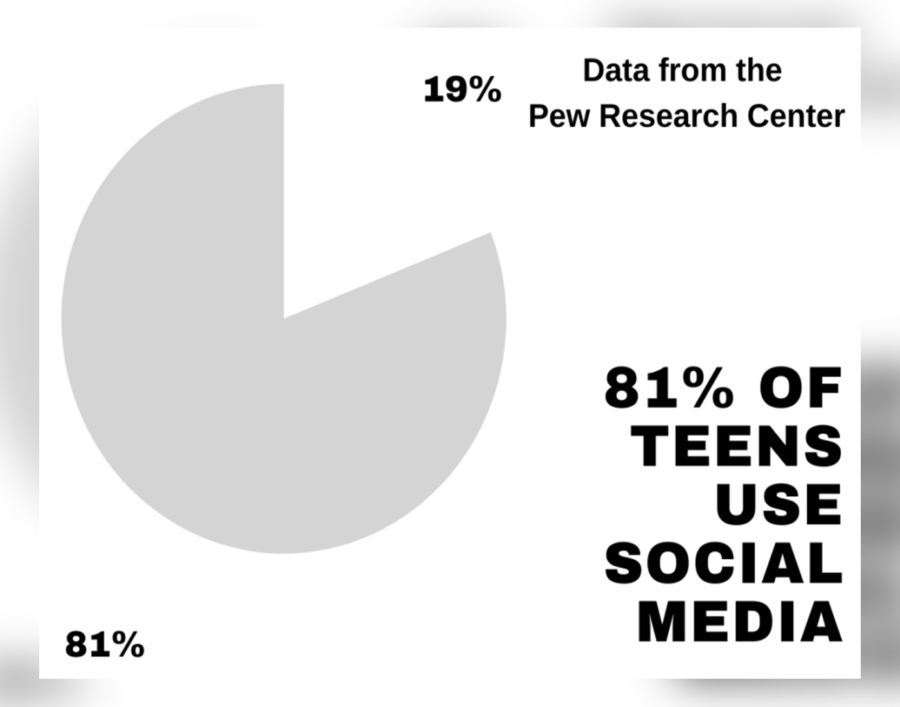What is normal? How mental health and social media have coevolved
March 23, 2022
Over the past few years, the conversation about mental health has changed immensely. The importance of ending the stigma around mental health has celebrities, influencers and users on various social media platforms speaking out. Alongside those speaking out, portrayals of characters in media have also been a crucial part in changing the conversation. Struggling with disorders like depression and anxiety is an isolating experience, but becoming comfortable participating in the discussion can help others feel less alone.
For decades, mental health has been villainized and often considered taboo. On the rare occasion that it was exemplified in the media, the representation was usually harmful which stigmatized the subject even further. In films like Shutter Island and American Psycho or bingeable shows like Criminal Minds, mental health issues are sensationalized in an effort to intrigue audiences. Representation like this perpetuates the idea that those who are struggling are deranged or unhinged. This idea sets the conversation back and does nothing to help those that are hesitant to speak out. In 2019, the American Psychological Association issued a survey on the public’s opinions on mental health. Results showed that 87% of Americans thought that having a mental illness was nothing to be ashamed of, but in another survey, it was recorded that 33% of Americans believe that those with mental disorders are people to be afraid of.
Although the stigma unfortunately still remains in many people’s minds, there is a lot of work going on to change that. Jill Daino, a Talkspace therapist, said, “The past decade has brought about a more open, less stigmatizing dialogue around mental health and illness.” It is always important to be educated when addressing a topic that people are frequently misinformed about. No one deserves to feel ashamed of what they’re going through personally.
Effects of social media on mental health
There is no doubt that social media and mental health go hand in hand. It can have positive effects like helping people connect to discuss their own experiences with mental health, but it can also be damaging. If someone is spending a lot of time on Instagram and TikTok, they can be exposed to a lot of content that may fuel negative thoughts. While some influencers are making an effort to have a positive presence online, some are making an effort to have their lives look as perfect as possible. When people see that some are living lavish and flawless lifestyles, it sparks feelings of unworthiness and envy. The UK Millennium Cohort study in 2018 linked excessive social media use to sleep issues which can be associated with depression, poor memory and bad academic performance. Ms. Tamara Langlois, a counselor at OHS, said, “As humans we have a desire for human connection that is now taken away because of social media which can impact mental health.” According to the Pew Research Center, “81% of teens in the United States are social media users, putting the majority of teens at risk for mental illness.” Decreasing online use can improve health and give people a better connection to friends and loved ones in their life.
On the positive side of social media, platforms like TikTok and Instagram have been efficient in spreading the normalization of mental health disorders. In the past few years, many influencers have been speaking out about their own experiences to help open up the conversation. Camryn Sullivan is one of the many influencers doing their part to spread awareness. They are active on almost every social platform, but Instagram is where they do the most to engage in the conversation. Sullivan has spoken out about how mental health issues were not seen as normal when they were growing up. In a post on Self-Care is for Everyone they said, “I have also learned that being treated by doctors for my mental health isn’t considered ‘normal’ and is barely socially accepted.” Until mental health is normalized, not everyone will feel comfortable enough to want to get better. Sophomore Josy Caudillo said, “I believe it should be normalized because everyone struggles with it even if they don’t look like they are.” It is time to give those struggling a safe environment they can get help in.
Celebrities changing the conversation
Being in the spotlight constantly can make it difficult to speak out on struggles. When someone is constantly trying to please those around them, especially a large fan base, they forget to focus on their own personal health. Recently, quite a few big names in the entertainment industry have come forward with their mental illness stories, which has helped decrease the stigma and build a connection between celebrities and fans. In an article, Emerald Psychiatry said, “By sharing their stories, society can realize that anyone can experience behavioral health conditions.” A few celebrities that have been candid about their battles are Ariana Grande, Britney Spears and Zayn Malik. Grande has dealt with PTSD, anxiety and depression, and she is constantly spreading awareness to her impressionable fans. In a post on Mental Health Awareness Month she said, “We’ve got to commit to making this time as healthy, peaceful and as beautiful as possible.” Alongside Grande, artists like Mitski, Lucy Dacus and Phoebe Bridgers never shy away from being open about their experiences within their music in the hopes they can be there for whoever needs it.
Work in other media like movies and TV series can also be a progressive way to communicate the experiences of those battling mental illness. The National Alliance on Mental Illness said, “Inaccurate representations of mental illness create barriers to reducing stigma, forcing mental health advocates to work overtime to undo these damaging stereotypes.” The last thing needed in the fight for normalcy is stereotypes getting further pushed onto people. Luckily, many high-acclaimed movies have managed to successfully illustrate the experience. This includes Inside Out, The Perks of Being a Wallflower and the new HBO Max original, The Fallout. The Fallout depicts how the trauma of a school shooting affects teenagers. An Independent Magazine article says, “The depiction of mental health in The Fallout is true to life and acknowledges that the process of healing is not linear.” Depictions like the ones seen in the movie are important for all to see. The characters are not portrayed as crazy or delusional — they are simply teenagers trying to make their way through life day by day.
COVID – 19 and mental health
COVID-19 was an unexpected twist for those already struggling with mental health. Being shut out from the outside world can have damaging effects on those who rely on human connection. Having the luxury of social media was a blessing to many during this time. Social media was used as an outlet for people to converse and relate with people through. Ms. Langlois said, “It was a good thing during COVID because it allowed kids to connect. But now we are forging ahead towards normal and it has been hard for kids to interact in person.” While social media was crucial in the role of assisting those with connecting with friends, it also pushed the struggle of not being able to communicate in the real world. COVID-19 made many feel isolated and deprived of human interaction. Going through a long period of time only seeing people through a screen, makes seeing people in-person nerve wracking and anxiety inducing.
Besides the effects of constant online use, teens also faced things that they may have never experienced previously. Mental health issues saw a significant increase in the times of COVID-19. Unicef conducted a poll about the impacts of the pandemic on adolescents. The poll revealed that 27% of the respondents felt anxiety and 15% felt depressed during the pandemic. The poll also found that 73% wanted help with their mental health situation, while 40% were still hesitant to get help. Although COVID-19 has left an everlasting effect on teens who had their youth taken away from them, they are starting to move forward and will hopefully get professional help for the long-term mental health issues the pandemic left them with.
How to help change the conversation
Never make anyone feel ashamed of their fight with mental illness. Making those in the midst of their struggle feel like a burden will do nothing but make them feel like they are not in a safe environment to speak openly. Mental health and illness is normal and advocacy is essential. It is important to check in on loved ones but never forget to practice self-care as well.
This was originally published in the print edition on March 18, 2022







